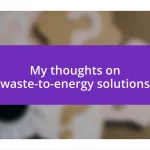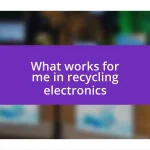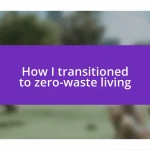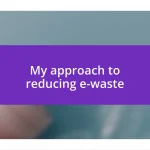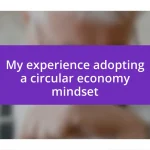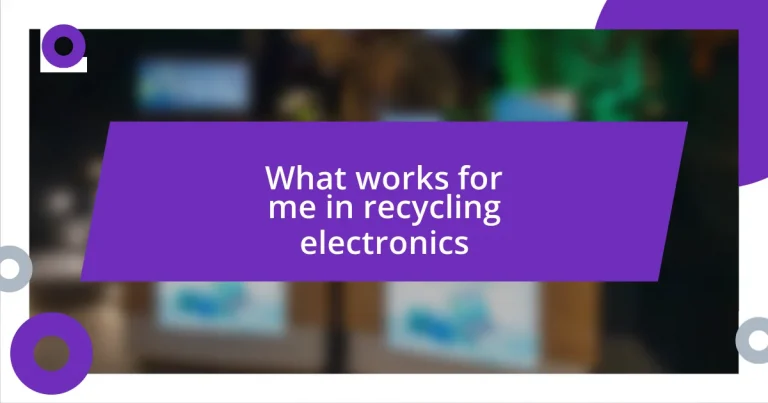Key takeaways:
- Understanding e-waste emphasizes the need for responsible disposal and highlights the environmental hazards posed by discarded electronics.
- Participating in community recycling events fosters collaboration and a sense of responsibility towards sustainability, transforming waste into valuable resources.
- Finding local recycling programs through community engagement and social media can enhance the recycling experience and educate others about the importance of proper disposal.
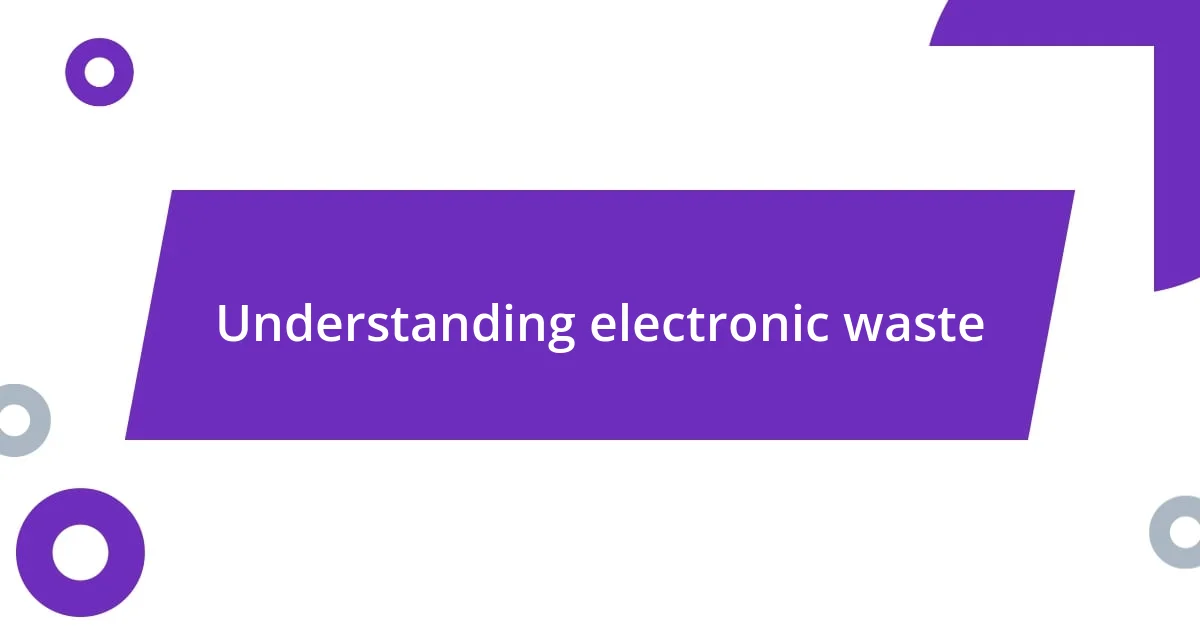
Understanding electronic waste
Electronic waste, or e-waste, is a growing concern that encompasses discarded electronic devices like smartphones, computers, and televisions. I remember cleaning out my closet and being shocked by how many outdated gadgets I had tucked away, wondering how many of these devices still had usable parts. It’s easy to overlook the sheer volume of e-waste produced each year, but it really makes you ponder: what happens to all this discarded technology?
With the rapid pace of technological advancement, many of us upgrade our devices more frequently than ever, often leaving the old ones to languish in drawers or ultimately ending up in landfills. I often reflect on the environmental impact of this behavior; e-waste contains hazardous materials that can leach into our soil and water. Isn’t it alarming to think that our forgotten electronics could pose such a significant risk to our planet?
Understanding e-waste also means recognizing the potential for recycling and reuse. I’ve had my own lightbulb moment when I learned about local e-waste drop-off events, which made me realize how simple it could be to responsibly dispose of my old devices. It begs the question: What if we all made a conscious effort to recycle our electronics instead of letting them gather dust?
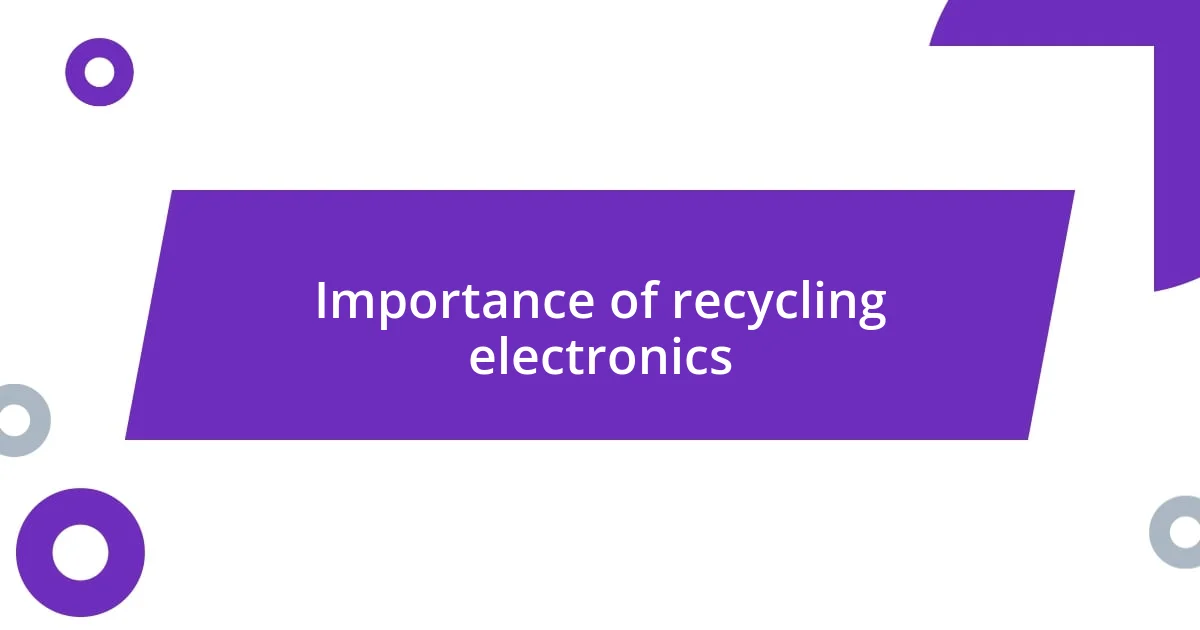
Importance of recycling electronics
Recycling electronics is crucial for both environmental and social reasons. Personally, I feel a sense of responsibility every time I dispose of an old device, knowing that my actions can make a difference. It’s striking to think that recycling just one million cell phones can yield the same amount of gold as mining 20 tons of ore, not to mention the other valuable materials that can be reclaimed. This aspect of recycling resonates with me deeply, as it highlights how we can transform waste into resources.
- Reduces environmental hazards by properly managing toxic substances.
- Conserves natural resources by reclaiming valuable materials.
- Decreases the volume of waste sent to landfills.
- Cuts down on greenhouse gas emissions associated with new production.
- Encourages a circular economy, where products are reused and repurposed rather than discarded.
One time, I took part in a local e-waste collection drive, and it opened my eyes. Seeing so many people bringing their old gadgets gave me hope. I realized firsthand that collaboration in recycling efforts can lead to meaningful change. When we recycle electronics, we’re not just clearing out clutter; we’re participating in a larger movement towards sustainability. This sense of community is both inspiring and necessary.
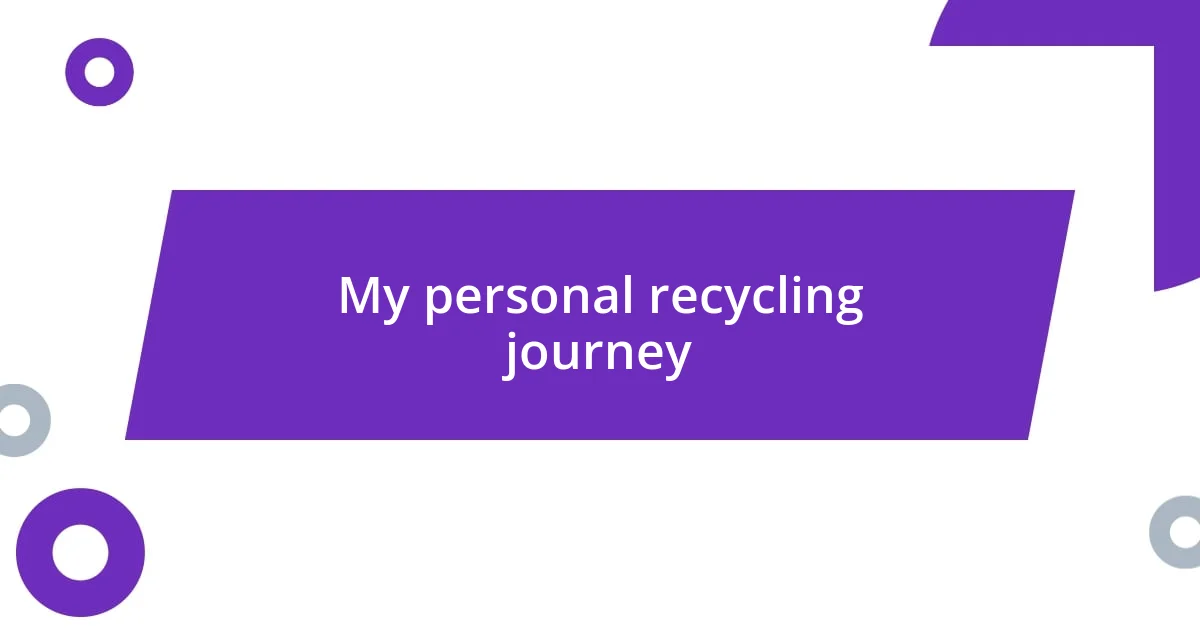
My personal recycling journey
I’ve navigated my own recycling journey with a blend of curiosity and determination. I started small, collecting old chargers and phones, wondering what to do with them. Each time I found a new home for an item I’d once deemed obsolete, I felt a little thrill — as if I was solving a puzzle while also reducing waste. It gradually dawned on me that every little action counts.
Attending a community workshop on electronic recycling was a pivotal moment for me. I remember the excitement in the room as we shared stories about our experiences, and experts unveiled the intricacies of e-waste processing. The energy was infectious! I learned how dismantling devices isn’t just about recycling; it is about recovering materials that can empower future innovations. It made me realize that my simple choices could ripple through the community.
Moreover, I’ve witnessed how engaging others heightens my recycling efforts. I once organized a small gathering among friends to declutter and recycle together. It was fascinating to see how everyone brought different gadgets, educating one another on proper disposal. The laughter and shared mission created a bond, underscoring that recycling isn’t just an isolated task; it’s a collective journey toward sustainability.
| Step | Action Taken |
|---|---|
| Starting Point | Collecting old gadgets at home |
| Pivotal Moment | Attending a community workshop |
| Engaging Others | Organizing a recycle gathering |
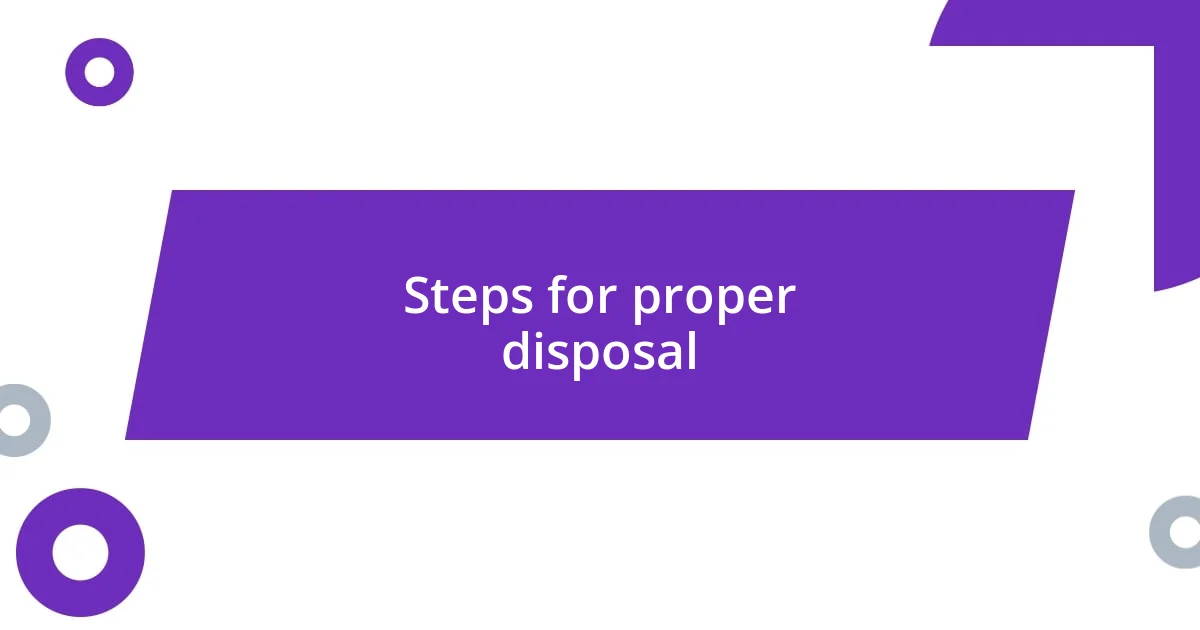
Steps for proper disposal
To ensure proper disposal of electronics, the first step for me is to gather all old devices, chargers, and accessories in one designated area. Once I have a collection, I inspect each item, thinking about its potential for reuse or recycling. It’s like a treasure hunt: I often find gadgets that can be repurposed, reminding me of how valuable these components can be.
After sorting through my items, I usually research local e-waste recycling programs or events. This often leads me to community initiatives, where I not only get to recycle responsibly but also meet like-minded individuals who share my passion for sustainability. Have you ever participated in a local recycling event? I encourage you to go — the camaraderie can be quite uplifting, and it’s reassuring to know that I’m not alone in these eco-friendly efforts.
Finally, I make sure to wipe my data from devices before handing them over. This not only protects my personal information but also reinforces my commitment to responsible disposal. It’s a small step that carries immense weight; after all, it combines the need for environmental action with the importance of personal privacy. And in doing so, I feel empowered, knowing I’m playing a part in safely recycling electronics while protecting myself.
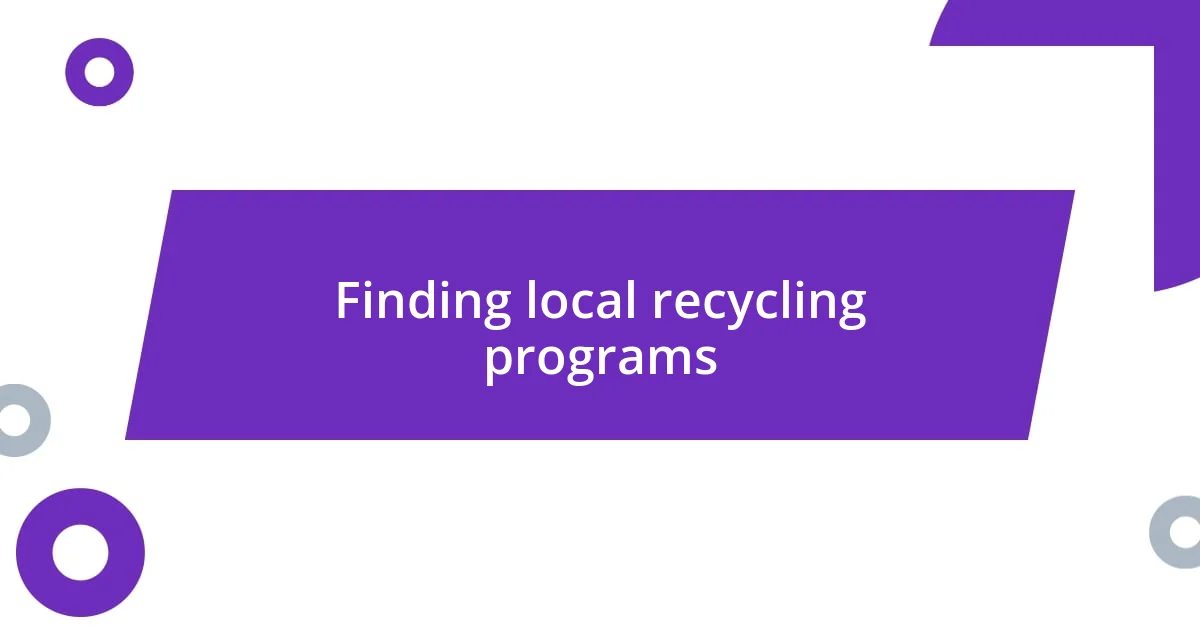
Finding local recycling programs
Finding local recycling programs can feel like a scavenger hunt, but trust me, the rewards are worth it! I often start by checking my city’s official website or calling the waste management department. I remember the first time I did this; I felt a mix of excitement and curiosity as I discovered a nearby tech recycling event, which not only helped me but also connected me with others in the community who were just as passionate about making a difference. Have you ever felt that spark of connection through a common goal?
Another approach that has worked well for me is tapping into social media groups focused on sustainability. I’ve come across incredible local initiatives just by scrolling through my feed! I clearly recall a post about a neighborhood e-waste collection day—it was a race against time, but I managed to gather a few boxes of old electronics to contribute. Engaging with fellow eco-warriors in these forums not only provides valuable information but can also inspire you with new ideas for reducing e-waste. Isn’t it amazing how our digital communities can lead to real-world change?
Lastly, local schools or community centers often run programs for electronic recycling. I once volunteered at a school event, and it was heartwarming to see kids learning about e-waste recycling hands-on. Their enthusiasm was contagious! By partnering with local institutions, we can help create an educational environment that promotes sustainability far beyond our individual efforts. What if every community prioritized teaching the next generation about responsible disposal? The impact could be monumental!
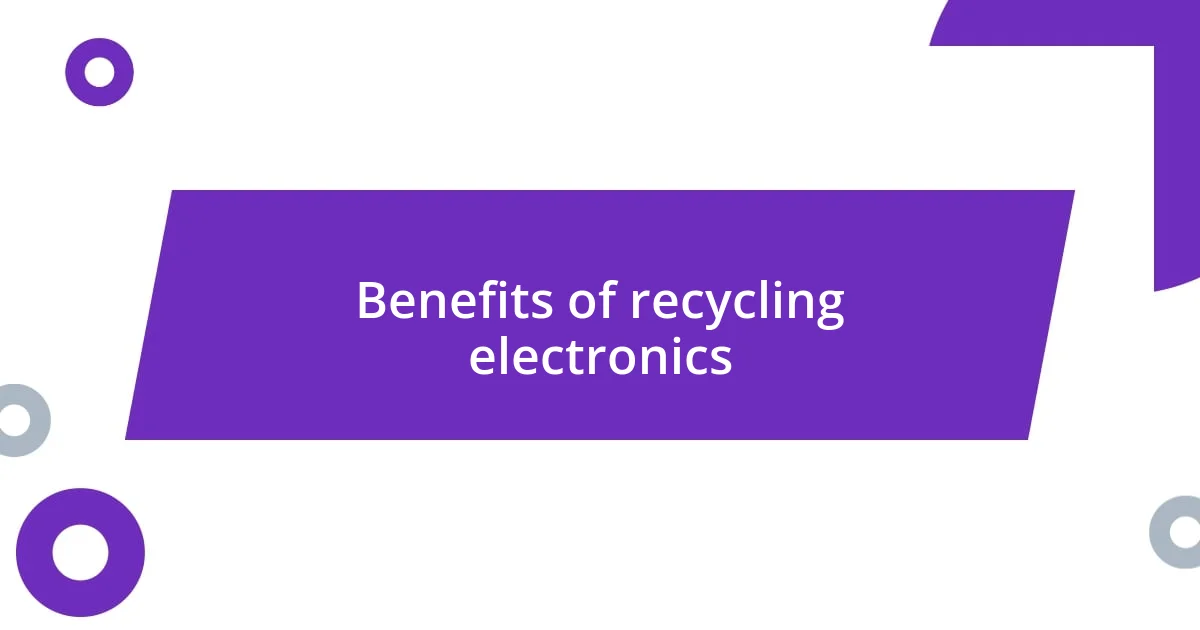
Benefits of recycling electronics
Recycling electronics offers numerous benefits, both for the environment and our communities. Personally, I find it incredibly satisfying to know that by recycling, I’m helping reduce the amount of electronic waste that ends up in landfills. I remember the first time I learned about the hazardous materials often found in old devices—things like lead and mercury. It hit me hard, realizing that my small actions could contribute to bigger environmental issues. Doesn’t it feel good to know that we can make a tangible difference just by properly disposing of our gadgets?
One of the surprising advantages I’ve encountered is the recovery of valuable materials through recycling. When I learned that precious metals like gold and silver can be extracted from electronics, I felt a sense of awe. It’s as if I was uncovering hidden treasure in the tech I no longer used! This process not only reduces the need to mine for these resources but also lowers the energy consumption associated with manufacturing new devices. Isn’t it remarkable to think that each old phone could contribute to new technologies?
Another benefit I cherish is the community engagement that often comes with e-waste recycling efforts. During a recent recycling day, I was struck by the diverse group of people who gathered, united by a shared commitment to sustainability. We swapped stories, strategies, and even tips on reducing our electronics footprint. It was one of those moments that reminded me of the power of collective action—what if every community embraced such initiatives? Just imagine how much more aware and proactive we could all become!

